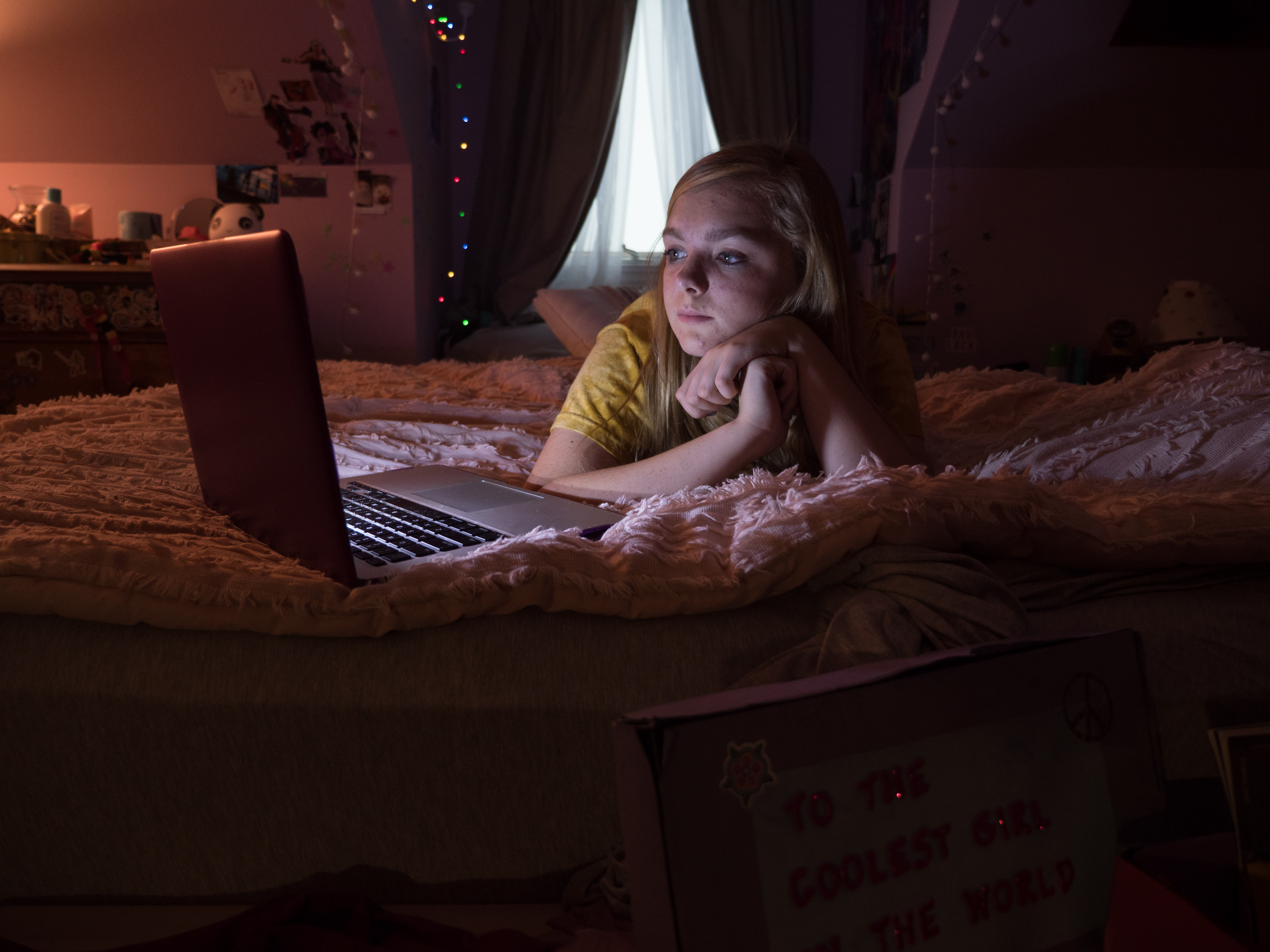Note: Spoilers ahead!
There are moments in Eighth Grade, YouTube star-turned-director Bo Burnham’s debut film, in which Elsie Fisher stars as eighth grader Kayla Day, that portray anxiety in such an illustrative and relatable way, that even those who claim to live a worry-free existence (those people are lying, by the way) will understand what it’s like to experience unbridled apprehension. While many of Kayla’s day-to-day feelings are common experiences for adolescents today — the desire for likes on Instagram, the eagerness to “grow up” and get to the next chapter — there are also moments that are specific to a person who lives with very real anxiety.
Our first glimpse of Kayla is behind the camera while she’s recording a YouTube episode, called “Being Yourself.” The topic is simple, but in ways that only youth can, she poses the discussion in a way that makes it feel complex. “What does it mean, being yourself? Aren’t I always myself? I guess being yourself is about not changing yourself.” As we get to know Kayla, we see that her wisdom on YouTube is in contrast with her intense self-consciousness, and she struggles to follow her own advice. On YouTube, she poses existential questions like how to put yourself out there “Where is there? Anywhere you wouldn’t normally go” and being confident “A big part of confidence is being brave, and you can’t be brave without being scared” but her social aptitudes are destroyed when she’s around other people. She acknowledges this disparity in the beginning of the film, when she says that people often mistake her for being quiet, but if you got to know her, you’d know she’s “actually really cool and funny and stuff.” This inability to be yourself around others is an example of what anxiety can look like among Gen Z youth, but it’s also a valuable example of anxiety for those of us who are older. (Personally, I couldn’t help but think about meetings I’ve been in where I sat silently. Where I’ve had things to say or opinions to share but didn’t, out of anxiety or fear that it would come out wrong and I’d be misunderstood.)
There’s also the scene where Kayla arrives at mean-girl Kennedy’s birthday pool party and experiences a full blown anxiety attack in a guest bathroom. The excruciating moment, enhanced by loud music and dizzying cinematography, isn’t exclusively relatable to people who experience frequent panic attacks — it’s relatable to anyone who has ever gone somewhere where they felt different, or unwelcome, or shamed. While watching, my highly-emotional self wanted to reach into the screen, hold her in the palm of my hand, and run away. I wanted to save her from that moment like I wished someone would have saved me when I was in similar situations, young and anxious and alone in strange bathrooms, not wanting to go outside to wherever I was supposed to be. The tension I felt only continued as she left the bathroom in her lime green Speedo and walked slowly toward the sliding door that led to the pool, only to realize it was jammed and she’d need to skinny-girl-slide her way through the slim opening. Ugh.
Mark, Kayla’s father, is a constant source of support throughout the film despite his daughter’s constant ridicule. For the majority of the film, he simply can’t do anything right. He’s told to knock louder on her door before entering (to penetrate the noise of her headphones), to look less “weird and quiet” while driving (but still no talking!), to ask less questions at the dinner table, etc. Still, he’s relentless in his attempts to connect with his teenage daughter, reminding her that he thinks she’s “really, really cool” and just needs to “put herself out there.” Honestly, he’s an exemplary father. Kayla reciprocates his love only at the end of the film, when she decides she’s done with her YouTube videos. This is also the moment that brought me (and the reporter next to me at the press screening) to tears.
“Does it make you sad to be my dad?” she asks. (It’s a question I often thought about when I was young and depressed, and sums up what so many people who experience a variety of mental health issues feel: that they are a burden to others.) “What? No! Being your dad made me brave.” She listens intently as a small smile appears on her face and she jumps into her father’s arms, and lets him hold her. It’s the first time in the film she allows him to give her the affection she seeks, and is an important reminder that in the face of interpersonal struggle, nothing can replace genuine human connection and unconditional love.
When saying goodbye to her YouTube channel, Kayla compares her perpetual anxiety to the feeling you get while waiting in line for a rollercoaster. She’s a role model for being an active participant in her own well-being, doing things to make herself feel better — like disconnecting from technology, or hanging out with Gabe, a boy who is kind and different from her other crushes. I hope this will be a film of the summer for people of all ages, and that it will inspire them to be more accepting of others who they perceive as different, not to mention more accepting of themselves.


